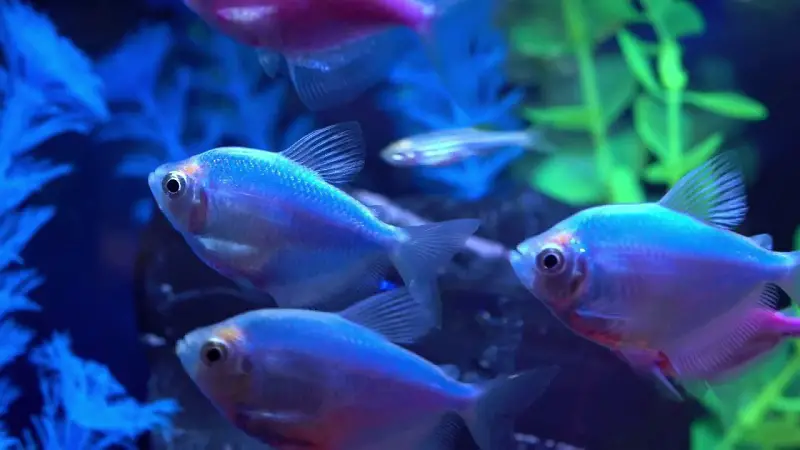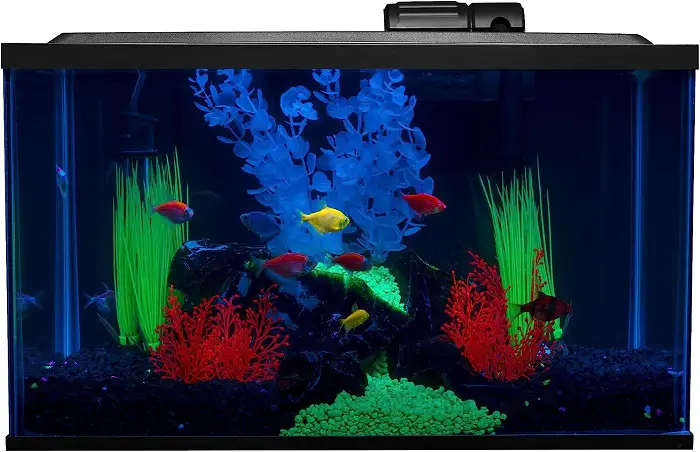Do glofish sleep? This is a question that has yet to be fully answered. Some people believe that glofish do sleep, while others believe they do not. There is some evidence that suggests glofish do sleep.
For example, when they are inactive or stressed, they often close their eyes. Additionally, when they are placed in complete darkness, they often become inactive and their breathing slows down.
However, there is also some evidence that suggests glofish do not sleep. For example, when active, their eyes remain open and they do not exhibit the same behavior as fish that are known to be asleep.
Additionally, when placed in complete darkness, they often become active and their breathing speeds up. Ultimately, it is still unknown whether or not glofish sleep.
The Sleeping Habits of Glofish

Have you ever wondered how Glofish sleep?
These vibrant creatures, known for their fluorescent colors and ability to glow in the dark, have fascinating sleeping habits that set them apart from other fish species.
Unlike humans who require a solid block of uninterrupted sleep, Glofish take power naps throughout the day and night, allowing them to rest while staying vigilant in their environment. Just like any living creature, they need their beauty sleep too!
Interestingly, when Glofish go into their active slumber mode, they may exhibit behaviors similar to hibernation. Their metabolic rate slows down significantly as they find a spot to settle in.
Don’t be alarmed if you see your Glofish floating still with its eyes closed; this is perfectly normal! It’s almost as if they have found a hidden sanctuary within their tank where time stands still.
So where do these captivating little swimmers choose the perfect spot for their midday siestas? Well, it turns out that Glofish are quite particular about where they sleep. They prefer areas with minimal lighting and dense plants or decorations that offer shelter and calmness. These hideaways provide them with security while allowing them to get some much-needed rest without any disturbances from fellow tankmates or human onlookers.
In conclusion, understanding the sleeping habits of our underwater friends can give us a deeper appreciation for the world beyond our own. The unique way in which Glofish adapt and rest not only showcases their remarkable resilience but also reminds us of the importance of creating peaceful environments for all creatures, both above and below the water’s surface. By providing suitable hiding spots and minimizing light pollution, we can help ensure that these vibrant fish have a safe haven to rejuvenate and recharge.
Furthermore, studying the sleeping patterns of Glofish can also shed light on their overall health and well-being. Just like humans, adequate sleep is crucial for their physical and mental development. It allows them to conserve energy, repair damaged tissues, and strengthen their immune system.
Signs that Your Glofish is Sleeping

Glofish are mesmerizing creatures that can bring vivid colors to your aquarium. But have you ever wondered how these tiny fish sleep?
Unlike humans, fish do not have eyelids to close and shut out the world. So, how can you tell if your Glofish is snoozing away?
One sign that your Glofish is sleeping is reduced activity level. If you notice your fish swimming slower and taking fewer trips around the tank, there’s a good chance they’re catching some Zs. Another clue can be a change in their coloration.
Some Glofish tend to fade or darken when they sleep, making it easier for predators to overlook them in the wild. So, while it might seem like their vibrant hues are always on display, a slight change in color could indicate that your little friend is actually catching up on some much-needed rest.
But what about their eyes? How do you know when they’ve drifted off into dreamland? A key sign of a sleeping Glofish is their eyes settling into an unusual position. While awake, fish usually keep their eyes forward-facing to scan for danger and locate prey. However, when they’re sleeping, their eyes may tilt downward or even roll back slightly – indicating that they are deep in slumber.
Understanding the signs of sleep in Glofish allows us to appreciate these remarkable creatures even more fully. Next time you observe your aquatic friends acting differently – with reduced activity levels and changes in coloration or eye position – take a moment to admire the beauty of their slumber.
It’s fascinating to think about what dreams these Glofish might be having as they rest peacefully in their underwater world.
The sleep patterns of Glofish can vary depending on various factors, such as the species and their environment. Some fish may require more sleep than others, just like humans. It is essential to provide them with a comfortable and safe habitat that promotes healthy sleep habits.
Do Glofish Sleep? (Summary)
Glofish do indeed sleep, but their sleep patterns and habits are different from those of other fish species. They enter a state of rest where they remain motionless for short periods of time and may even close their eyes.
This period of rest allows them to conserve energy and recharge for the next day. While it may not look like traditional sleep, Glofish still requires this downtime to maintain their overall health and well-being.
Understanding the sleep patterns of Glofish can help aquarium owners provide the best care for these unique creatures. So, next time you observe your Glofish resting, remember that they too need their beauty sleep.
Other Blog Posts
- Do air pumps add oxygen to aquarium water?
- Can you have a puffer fish as a pet?
- Are glofish sterile?